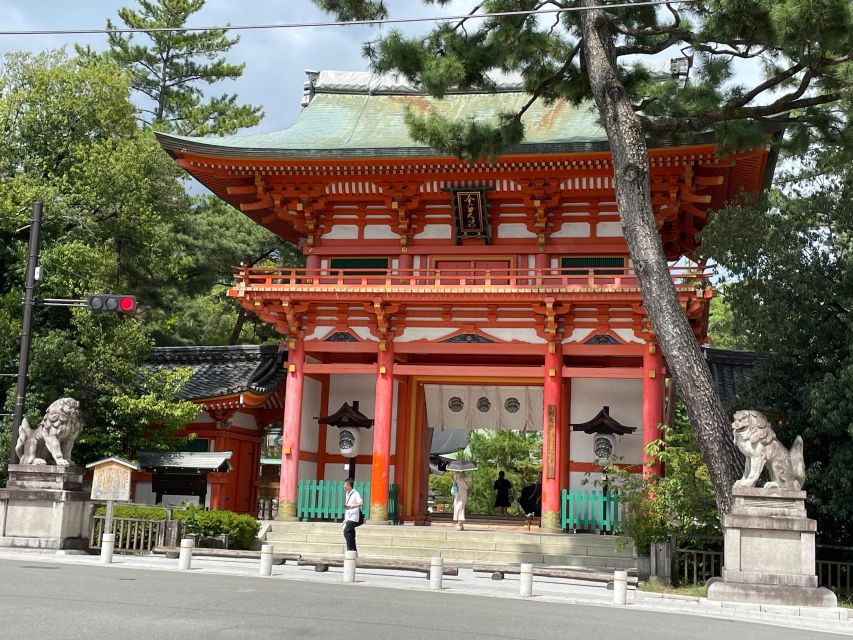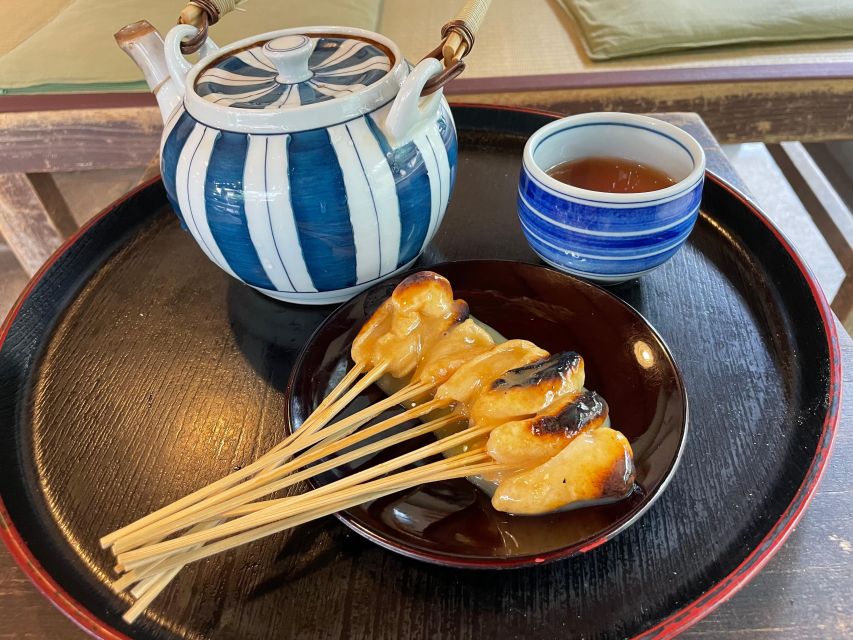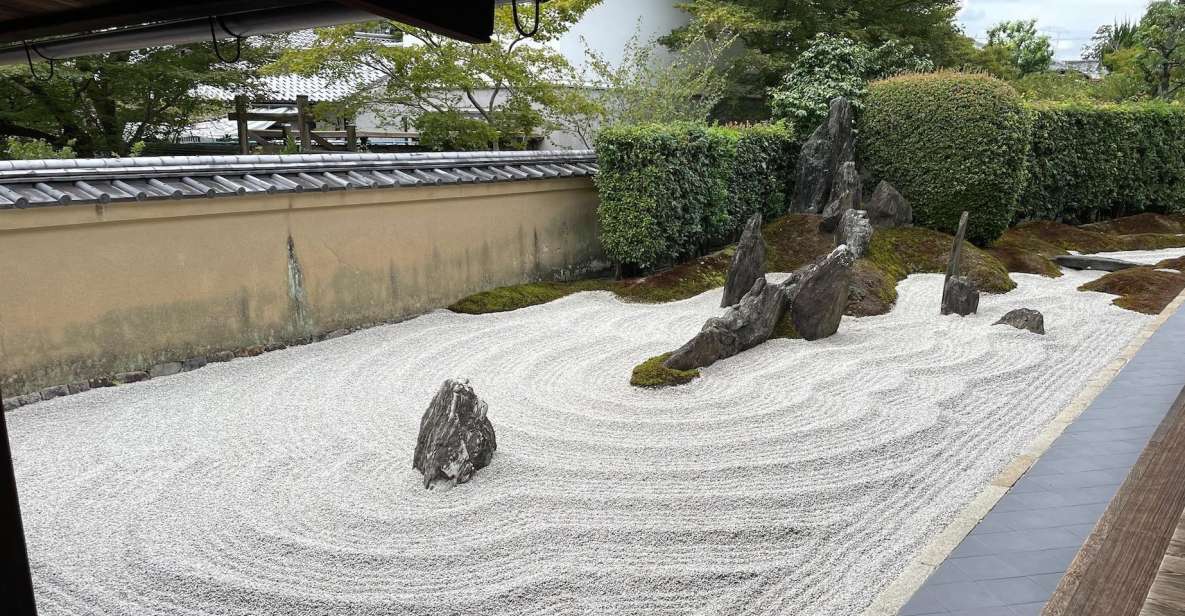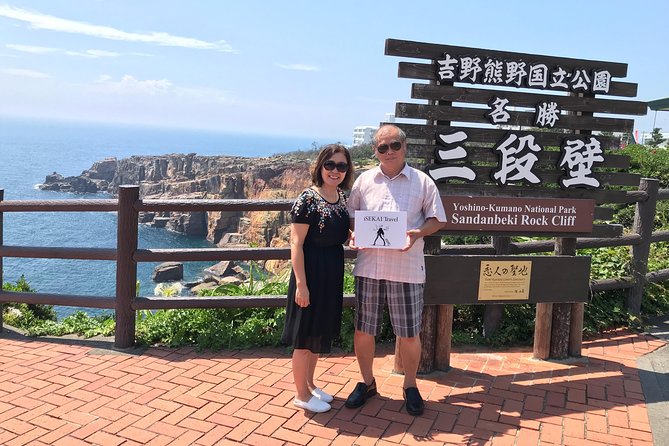In the heart of Kyoto, a city steeped in tradition and beauty, lies a harmonious blend of nature and culture. Serene zen gardens, meticulously designed with precision and artistry, offer a sanctuary of tranquility amidst the bustling city. These gardens, like a breath of fresh air, provide a haven for visitors to find peace and solace in the midst of their busy lives.
But Kyoto has more to offer than just picturesque landscapes. It is also home to the oldest sweets in Japan, a testament to the city’s rich culinary heritage. Indulge in the famous aburimochi, a traditional sweet that has stood the test of time, and embark on a journey that will awaken all your senses.
Join us as we explore the serene zen gardens and savor the oldest sweets in Kyoto, a truly enchanting experience awaits.
Quick Takeaways

- Serene Zen gardens offer a tranquil and peaceful environment for meditation and reflection.
- The Daitokuji Zen Temples in Kyoto showcase a variety of architectural styles and rich history.
- Kyoto’s oldest cafes provide an authentic experience to indulge in the famous aburimochi, the oldest sweet in Japan.
- Imamiya Shrine offers an opportunity to learn about proper shrine etiquette and the customs and practices of Shinto.
Not for you? Here's a few more great tours and experiences nearby.
Morning Visit to Daitokuji Zen Temples

During the morning tour, visitors will have the opportunity to explore the Daitokuji Zen Temples in Kyoto. They can enjoy the tranquility of the zen gardens and discover the rich history of the temples.
Daitokuji is a collection of small zen temples, each with its unique design and story. As visitors wander through the temples, they’ll experience the serenity and authenticity of the early morning visit.
The gardens, meticulously designed with stone and greenery, offer a peaceful atmosphere for contemplation and reflection. Plus, the temples themselves hold a wealth of history, providing insight into the development of Zen Buddhism in Japan.
Exploring the tranquility of the zen gardens and discovering the history of Daitokuji temples create a memorable and enlightening experience for visitors.
You can also read our reviews of more tours and experiences in kyoto.
Exploring Unique Temple Designs and History

Visitors can explore the fascinating history and distinctive architectural designs of the temples as they explore the Daitokuji Zen Temples in Kyoto.
- Exploring temple architecture: The Daitokuji Zen Temples showcase a variety of architectural styles, ranging from the elegant simplicity of the Koto-in Temple to the grandeur of the Daisen-in Temple. Each temple has its own unique design, reflecting the creativity and craftsmanship of the builders.
- Cultural significance of Zen gardens: The temples are also home to exquisite Zen gardens, carefully designed to promote tranquility and contemplation. These gardens feature meticulously arranged rocks, sand patterns, and carefully pruned trees, creating a harmonious and serene atmosphere. They aren’t merely decorative, but are considered an important part of Zen practice, providing a space for meditation and reflection.
- Rich history: The Daitokuji Zen Temples have a rich history that dates back to the 14th century. Many of the temples have survived wars and natural disasters, preserving their cultural heritage. Exploring these temples allows visitors to enjoy the centuries-old traditions and spiritual practices of Zen Buddhism.
Authentic Experience at One of Kyoto’s Oldest Cafes

One of Kyoto’s oldest cafes offers visitors an authentic experience with its rich history and traditional ambiance. This historic cafe, established 1000 years ago, provides a glimpse into the past and a taste of traditional Japanese sweets.
Upon entering the cafe, guests are transported to a bygone era with its traditional decor and warm atmosphere. Here, visitors can indulge in the famous aburimochi, known as the oldest sweets in Japan. These delectable treats, made with grilled rice cakes and sweet soy sauce glaze, have been enjoyed for centuries.
With its long-standing legacy and commitment to preserving tradition, this cafe provides a truly authentic experience for those seeking to enjoy Kyoto’s cultural heritage.
Sampling the Oldest Sweets in Japan
.jpg)
To experience the oldest sweets in Japan, visitors can indulge in the famous aburimochi at one of Kyoto’s historic cafes. Aburimochi is a traditional Japanese sweet made from mochi rice cakes that are grilled and then coated with a sweet soy sauce glaze. It has a chewy texture and a rich, savory-sweet flavor. Trying aburimochi in Kyoto is a must for anyone interested in exploring the history of traditional Japanese sweets.
This delicacy dates back centuries and holds great significance in Japanese culture. By sampling aburimochi, visitors can discover the deep-rooted traditions and culinary heritage of Kyoto. It’s a unique and delicious way to take in the rich cultural tapestry of this ancient city.
Learning Proper Shrine Etiquette at Imamiya Shrine

At Imamiya Shrine, visitors can learn proper shrine etiquette through a guided tour. This experience provides valuable insights into shrine customs and Shinto practices.
The tour guides at Imamiya Shrine are knowledgeable and passionate, ensuring that visitors understand and respect the traditions of this sacred place. Participants will learn about the appropriate way to bow, cleanse themselves before entering the shrine, and offer prayers. They’ll also gain an understanding of the significance of the various symbols and rituals observed at the shrine.
Meeting Point and Important Information
.jpg)
Visitors participating in the Serene Zen Gardens and the Oldest Sweets in Kyoto tour can find their meeting point just outside Kitaoji station on Kitaoji street, where the guide will be waiting.
Before embarking on the tour, it’s important to take note of some safety precautions and important information. Here are three key points to keep in mind:
- The guide won’t be liable for any injuries or loss during the tour, so it’s essential to exercise caution and be mindful of your surroundings.
- It’s highly recommended to have overseas travel insurance to ensure you’re adequately covered in case of any unexpected incidents.
- It’s important to carry enough cash in Japanese Yen as some small stores don’t accept credit cards, allowing you to fully learn about the cultural significance of the tour.
Frequently Asked Questions

Is Transportation Provided to the Meeting Point at Kitaoji Station?
Transportation to the meeting point at Kitaoji station is not provided. Guests are responsible for making their own arrangements. It is recommended to check local transportation options for a convenient and timely arrival.
Are There Any Age Restrictions for Participating in the Tour?
There are no age restrictions for tour participation. People of all ages can join and enjoy the experience. It is a family-friendly activity that allows everyone to explore the serene zen gardens and taste the oldest sweets in Kyoto.
Can I Purchase the Aburimochi Sweets as Souvenirs?
Yes, visitors can purchase aburimochi sweets as souvenirs. Aburimochi is a traditional Japanese sweet and can be found in various stores in Kyoto. It is a popular choice among travelers looking for authentic Japanese treats.
Are There Any Restroom Facilities Available During the Tour?
Restroom facilities are available during the tour for convenience. The tour also offers accessibility options to ensure a comfortable experience for all participants.
Is Photography Allowed During the Visit to the Zen Temples?
Photography restrictions may apply during the visit to the zen temples due to their cultural significance. Visitors should respect the rules and guidelines set by the temples to preserve the sanctity of the surroundings.
The Sum Up
.jpg)
To sum it up, Kyoto’s serene zen gardens and oldest sweets offer a unique and immersive experience in Japanese culture and history.
Visitors can explore the meticulously designed landscapes of Daitokuji Zen Temples, learn about temple designs and history, and indulge in the famous aburimochi at one of Kyoto’s oldest cafes.
Plus, they can learn about proper shrine etiquette at Imamiya Shrine.
By immersing oneself in the rich heritage and traditions of Kyoto, one can truly appreciate the harmonious blend of nature and culture that the city has to offer.
More Tour Reviews in kyoto
Not for you? Here's more nearby things to do in kyoto we have reviewed
- Private Airport Transfer Kansai Airport in Kyoto Using Hiace
- Samurai Experience & Kenbu Show in Kyoto
- Perfect 4 Day Sightseeing in Japan
- Osaka Kansai Airport (KIX) to Kyoto – Arrival Private Transfer
- Online Japanese Tea Meditation
- Our Family-Only Trip (Osaka, Kyoto, Nara, Kobe) / Free of Charge
- Samurai Sword Experience in Kyoto (Family & Kid Friendly)
- Mt Koya 2-Day Private Walking Tour From Kyoto
- Private Kyoto Geisha Districts Walking Tour
- Simple Kimono Plan&Gorgeous Kimono Experience
- Private Customized 3 Full Days Tour Package: Discover Kyoto, Arashiyama and Nara
- Private Sedan Hire in Osaka Kyoto Nara Kobe With English Speaking Driver



